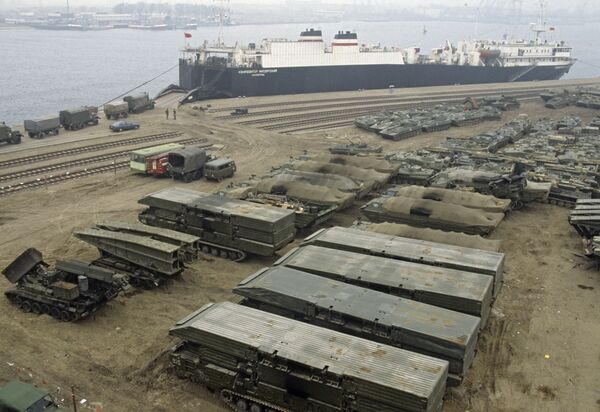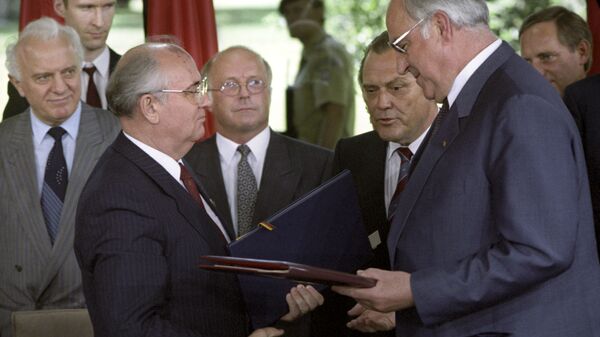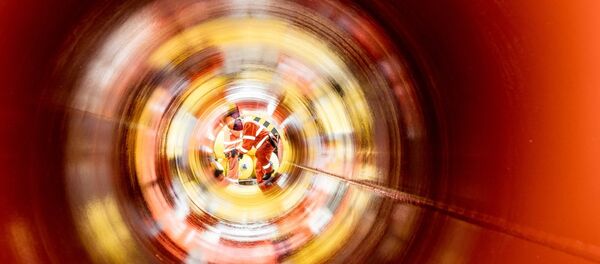Without the USSR as a whole and Soviet leader Mikhail Gorbachev specifically, Germany would have been left divided, and the Kremlin would have been left without a reliable partner in Europe, Dr. Ernst-Jorg von Studnitz, Germany’s former ambassador to Russia, has said.
“German Chancellor [Helmut] Kohl always said that the key to German reunification lay in Moscow. In this regard, of course, the USSR headed by then-General-Secretary Mikhail Gorbachev played a very important role. Without their participation, it would have been impossible to make German unity a reality,” Studnitz said in an interview with Sputnik.
“On the other hand, it would have been impossible for Chancellor Kohl to reach a solution at the talks in Moscow without consistent support from US President George H.W. Bush,” the retired diplomat added, referring to the German chancellor’s trip to the Soviet capital for negotiations with Gorbachev in February 1990.

It was in Moscow’s objective interest to ensure détente in Europe, and for Gorbachev, achieving it meant supporting German reunification, Studnitz explained. In return, he said, the USSR, and Russia after it, received “a major political prize” in the form of “a reliable partner – a united Germany in Europe.”
In his home country, Gorbachev has been criticized for his alleged betrayal of the USSR’s Eastern Bloc allies, including East Germany, and for ‘selling off’ the latter for a pittance which did not even include the cost of redeploying the hundreds of thousands of Soviet troops stationed in the country back to the USSR. In addition, he has been censured for undermining Moscow's security by failing to obtain a formal guarantee from NATO not to expand east beyond the borders of the former East Germany. Instead, US Secretary of State James Baker made Gorbachev a verbal commitment, which Washington has repeatedly broken over the past 20+ years by incorporating every former member of the Warsaw Pact alliance, plus six former Soviet and Yugoslav republics, into the Western military bloc.

Studnitz also emphasized that without protests by the East German people in 1989 and 1990, along with the consent and cooperation of all four WWII-era Allies – the USSR, the US, the UK and France, “German reunification would not have happened.”
West Germany’s British and French allies initially expressed hesitation at the concept of a united Germany, with Prime Minister Margaret Thatcher saying, as late as December 1989, that unification was “not currently on the agenda.” Before that, Thatcher told Gorbachev that the UK and Western Europe as a whole did not want to see a united Germany, which she feared could become a “destabilizing force in Europe.” French President Francois Mitterrand similarly argued that Germany was a country which had “never found its true frontiers,” and told Thatcher that he feared the return of a “bad” Germany which could “make even more ground [in Europe] than had Hitler” did, leaving “only Romania and Bulgaria for the rest of us.”
In 1985, when Gorbachev came to power, the USSR’s foreign debt amounted to $31 billion, equivalent to about 1 percent of the country’s GNP. By 1991, thanks to a string of rash economic reforms which disorganized the planning system but failed to create a proper market economy, as well as the loss of the USSR’s traditional trade partners, including East Germany, Soviet debt ballooned to about $140 billion, with Russia left on the hook to pay off about $104.5 billion of that after the Soviet collapse. Russia finally paid off the last of its Soviet-era debts in 2017.
Studnitz served as Germany's ambassador to Russia between 1995 and 2002. In 2011, Russian President Dmitry Medvedev awarded the diplomat the Order of Friendship for his commitment to improving Russian-German relations.




